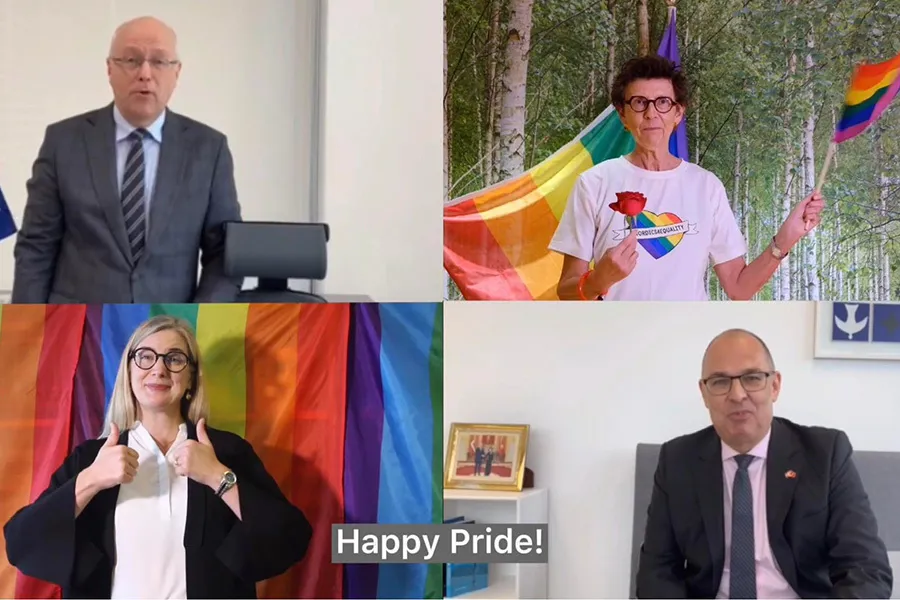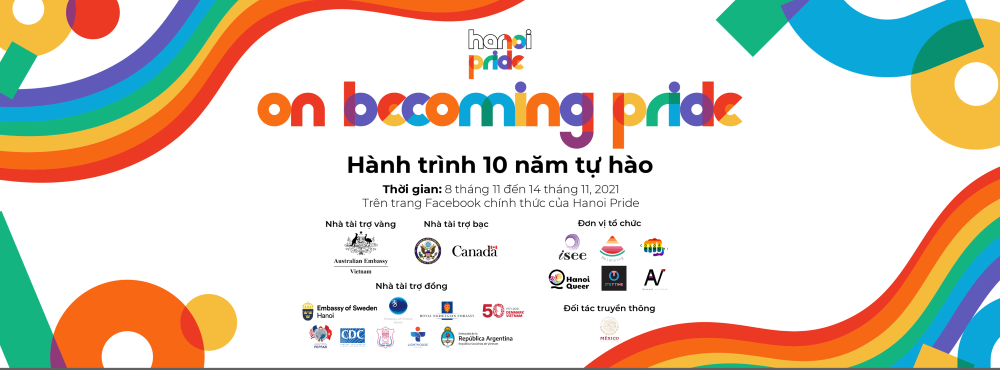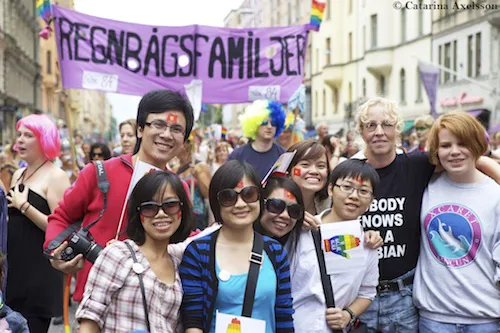Nordic efforts help LGBTIQ+ community full of love, inclusivity, equality
This is the 6th consecutive year Nordic embassies in Hanoi stand united with people of all nationalities and sexual orientations to increase visibility and combat discrimination.
This year marks the 10th anniversary of the Hanoi Pride, one of the most significant events in Vietnam for the LGBTIQ+ (Lesbians Gay, Bisexual and Transgender, Intersex, and Queer +) community.
Contributing to the celebrations over the past years includes four Nordic Embassies in Hanoi namely Denmark, Finland, Norway, and Sweden.
| Nordic (Finland, Norway, Sweden, and Denmark) Ambassadors to Vietnam support the Hanoi Pride. Photo: Nordic Embassies in Hanoi |
Under the theme ‘OnBecomingPride’, the Hanoi Pride 2021 will cover different digital channels to be performed on November 8-14.
The series of hybrid events are expected to attract tens of thousands of people in Vietnam and all over the world with various interesting programs, such as online campaigns, panel discussion radio, marathons, film screening, and pride fashion week, among others.
Both local and foreign experts and activists will take part in the Hanoi Pride 2021.
This is the sixth year in a row that the Nordic embassies in Hanoi join the Hanoi Pride and stand united with people of all nationalities and sexual orientations to increase visibility and raise awareness of LGBT+ issues and combat discrimination.
As strong supporters for the event, the Nordic Ambassadors to Vietnam said “Congratulations to the Hanoi Pride on the 10th anniversary of its path of pride! Denmark, Finland, Norway, and Sweden are proud to be long-term supporters of Hanoi Pride and the values it pursues: love, inclusivity, and equality for all.
“While our countries are striving hard to build societies without stigma and discrimination, societies that celebrate inclusivity, love, diversity, and freedom for all citizens it also took us many years of persistent and continuous efforts to arrive at where we are today. So nothing should be taken for granted, we have to continue the work until all people are treated equally by both the law and in daily life regardless of whom they choose to love and to live with,” said the Nordic Ambassadors to Vietnam.
All over the world, LGBTIQ+ people still face discrimination and violence. Everyone should be free to be themselves, no matter who they are, where they live and who they love.
Part of this year’s series is the screening of the movie “My Father Marianne” organized at the Swedish Residence, Hanoi. Swedish Ambassador to Vietnam Ann Måwe is among Nordic diplomats advocating the Hanoi Pride.
| The Hanoi Pride celebrates its 10th anniversary in 2021. |
Defending LGBTIQ+ community
The UN Universal Declaration on Human Rights requires states to ensure non-discrimination. Likewise, the 2030 Agenda for Sustainable Development calls for attention to be given to ensuring non-discrimination so that no one is left behind.
The first-ever Vietnam LGBTIQ+ series took place in Hanoi on 5 August 2012. To date, pride parades have been held in around 35 other cities and provinces.
In July 2012, the Minister of Justice announced that the Government of Vietnam had started a consultation on whether to legalize same-sex marriage. In June 2013, the Ministry of Justice submitted a bill that would remove the ban on same-sex marriage from the Law on Marriage and Family. In September 2013, the Government issued a decree abolishing the fines on same-sex marriages.
In 2015, Vietnam enacted a law enshrining rights for transgender people, making it one of the first countries in Asia to do so. However, the bill to enforce that law has still not been passed to date, continuing the legal confusion. This leaves transgender persons vulnerable and marginalized facing stigma and discrimination in access to justice, social security, health services, education, housing, and decent work.
Exemplary models
For decades, Denmark has been amongst the most progressive nations in the world for LGBTIQ+ equality. It decriminalized homosexuality in 1933. Gender confirmation surgery first took place here in 1951. The country introduced anti-discrimination legislation in 1987 and two years later legalized same-sex partnerships.
In 2014, Denmark became the first country to allow a legal change of gender without requiring prior medical approval, and in 2017 were the first to remove being transgender from the list of mental illnesses. It has further to go but equality and human rights are in our DNA.
Finland has been consistently ranked among the top countries in the world in protecting the rights of the LGBTIQ+ community. It was also recently elected as a member of the UN Human Rights Council for our long-term work in promoting universal human rights.
The country legalized same-sex marriage in 2017 as a result of participatory democracy. The Penalty Code of Finland criminalizes discrimination towards a person's sexual orientation. The Finnish Government is currently in the process of renewing laws concerning transgender rights, to make them more equal and fairer.
Norway is regarded as one of the world’s most LGBTIQ+ friendly nations. In 1972, the country legalized same-sex sexual activity. In 1981, Norway became the first country in the world to enact an anti-discrimination law that included sexual orientation. In 1993, registered partnerships were legally allowed. In 2016, Norway introduced a law permitting legal changes of gender with no psychiatric or psychological evaluation required. Transgender people are also covered by Norway's anti-discrimination laws on issues such as housing and employment.
Norway will continue the support to make sure that all people are safe wherever they live and be able to live openly as the person they are, regardless of their sexual orientation and gender identity.
Over the last decades, Sweden has taken steps aiming to ensure that the LGBTIQ+ community enjoys the same rights and opportunities as everyone else.
In 1972, Sweden became the first country in the world to legally allow sex reassignment surgery. Discrimination based on sexual orientation, gender identity, and gender expression became illegal in 1987. Adoption rights for gay and lesbian couples were passed in 2003. Same-sex marriage in Sweden has been legal since May 2009.
What makes Sweden one of the most LGBTIQ-friendly countries is that people continue to fight for further improvements. Stockholm Pride for instance has a Stockholm Pride international solidarity fund, founded in 2006, which supports pride events in other countries.
According to the 2019 LGBT travel index, Sweden was named the most LGBT-friendly country in the world for gay and trans travelers. Also see a personal story of Tam Nguyen attending the 2011 Stockholm Pride. The experience was so inspirational that she thought that an activity like this one must happen in Vietnam.
| Vietnam's representatives in the 2011 Stockholm Pride. Photo: Catarina Axelsson |













